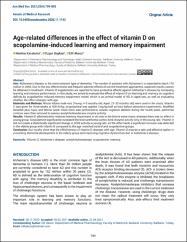| dc.contributor.author | Karabulut, Medine | |
| dc.contributor.author | Baykan, Özgür | |
| dc.contributor.author | Aksöz, Elif | |
| dc.date.accessioned | 2023-02-03T07:21:30Z | |
| dc.date.available | 2023-02-03T07:21:30Z | |
| dc.date.issued | 2021 | en_US |
| dc.identifier.issn | 2636-7688 | |
| dc.identifier.uri | https://doi.org/10.5455/annalsmedres.2020.11.1143 | |
| dc.identifier.uri | https://hdl.handle.net/20.500.12462/12838 | |
| dc.description.abstract | Aim: Alzheimer's disease is the most common type of dementia. The number of patients with Alzheimer's is expected to reach 115million in 2050. Due to the low effectiveness and frequent adverse effects of current treatment approaches, expected results cannotbe obtained in treatment. Vitamin D supplements are reported to have protective effects against Alzheimer's disease by increasinglearning and memory performance. In this study, we aimed to evaluate the effect of vitamin D on learning and memory on cognitivedeficits by scopolamine-induced memory impairment model, which is an animal model of AD, in aged rats, as well as evaluatingwhether the effect changes with age.Materials and Methods: Wistar Albino male rats (Young: 4-5 months old, Aged: 21-22 months old) were used in the study. VitaminD was given for three weeks at 500 IU/kg; scopolamine was applied 1mg/kg half an hour before behavioral experiments. Modifiedelevated plus maze and Morris water maze tests was performed to assess cognitive abilities during the fourth week; prefrontalcortices were then removed to assess acetylcholinesterase enzyme activity. Results: Vitamin D administration restored memory impairment in old rats in the Morris water maze; whereas there was no effect inyoung group. Scopolamine significantly increased the brain prefrontal cortex AchE enzyme activity only in the young rats. Vitamin Ddid not create a statistically significant change in AChE activity in young rats. on the other hand, a significant increase was detectedin the elderly group with vitamin D compared to the age-matched control and scopolamine groups. Conclusion: Our results show that the effectiveness of vitamin D changes with age. Vitamin D may be a safe and effective option inpreventing dementia development in the elderly group and improving cognitive dysfunction due to Alzheimer's disease. | en_US |
| dc.language.iso | eng | en_US |
| dc.publisher | İnönü Üniversitesi Tıp Fakültesi | en_US |
| dc.relation.isversionof | 10.5455/annalsmedres.2020.11.1143 | en_US |
| dc.rights | info:eu-repo/semantics/openAccess | en_US |
| dc.rights | Attribution-NonCommercial-NoDerivs 3.0 United States | * |
| dc.rights.uri | http://creativecommons.org/licenses/by-nc-nd/3.0/us/ | * |
| dc.subject | Vitamin D | en_US |
| dc.subject | Alzheimer’s Disease | en_US |
| dc.subject | Acetylcholinesterase | en_US |
| dc.subject | Scopolamine | en_US |
| dc.subject | Memory | en_US |
| dc.title | Age-related differences in the effect of vitamin D onscopolamine-induced learning and memory impairment | en_US |
| dc.type | article | en_US |
| dc.relation.journal | Annals of Medical Research | en_US |
| dc.contributor.department | Sağlık Bilimleri Enstitüsü | en_US |
| dc.contributor.authorID | 0000-0002-8732-4301 | en_US |
| dc.contributor.authorID | 0000-0001-8551-9600 | en_US |
| dc.contributor.authorID | 0000-0002-4827-804X | en_US |
| dc.identifier.volume | 28 | en_US |
| dc.identifier.issue | 4 | en_US |
| dc.identifier.startpage | 799 | en_US |
| dc.identifier.endpage | 805 | en_US |
| dc.relation.publicationcategory | Makale - Ulusal Hakemli Dergi - İdari Personel ve Öğrenci | en_US |




















